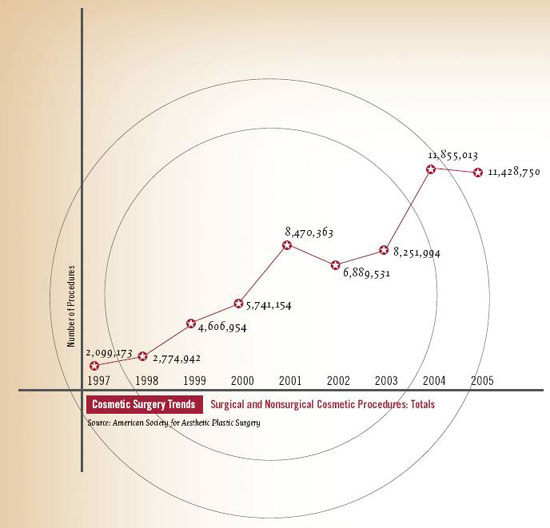Let me just start off by saying that this is my favorite article that I have discovered so far in my plastic surgery blog. I think it discusses many crucial points and can be very useful in my argument.
This second article from Washington Post is about the tragic death of Donda West, mother of Kanye West, world renowned hip-hop artist. However, there is a deeper, underlying message behind this story; this article expresses the media viewpoint on cosmetic surgery, and it is so true. The Post makes a great point by saying that since Donda West passed away due to complications during a tummy tuck, she was uncomfortable with aging gracefully, and lose weight the normal way by exercising. So was she really narcissistic and selfish like the public is making her out to be? Is it really fair to encourage people to adopt the perfectionist attitude towards self appearance, and then criticize them for choosing cosmetic surgery as their means for making themselves fit the old of society? This is yet another area of duplicity, a double standard if you will; people are generally only accepted into society if they look "good." We are constantly encouraged to change our bodies, and keep up with the trends to be more appealing to the eye. We are all expected to look like celebrities, many of which are spokespeople for cosmetic surgery. However, if we decide to take that route in life we are put down and criticized for not doing it the "natural way." This does not mean I am condoning plastic surgery
at all, I am just making a point as to the way society and the media pressures everyone into being perfect. Perfection is unattainable. No one is or ever will be perfect. We should all stop caring so much about what other people think and be content with what we are given...our bodies work for us, and we shouldn't change them for such purposes.

The article also brings up another good point; Does race have anything to do with plastic surgery? According to statistics in the Post it does. "Of the 11.5 million cosmetic surgery procedures performed last year on men and women, only 6 percent of the patients were African American, according to the American Society for Aesthetic Plastic Surgery. Black women are less likely than whites to compare themselves with the Hollywood, fashion magazine, air-brushed standard of beauty." I find this very interesting...first of all 11.5 million surgeries, WOW! And only 6% of which were African American... it seems rather stereotypical because obviously African American women are known to be more curvy and such, but I think it is a great thing that they don't try to identify so much with stick figures...this is the kind of trend people should be following!










